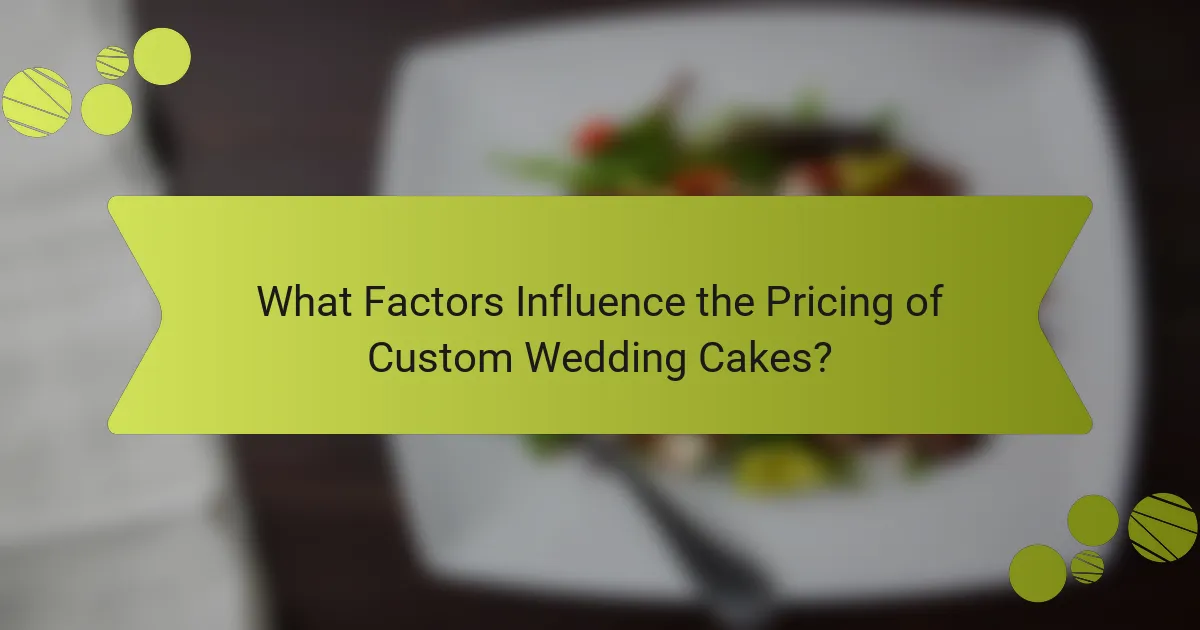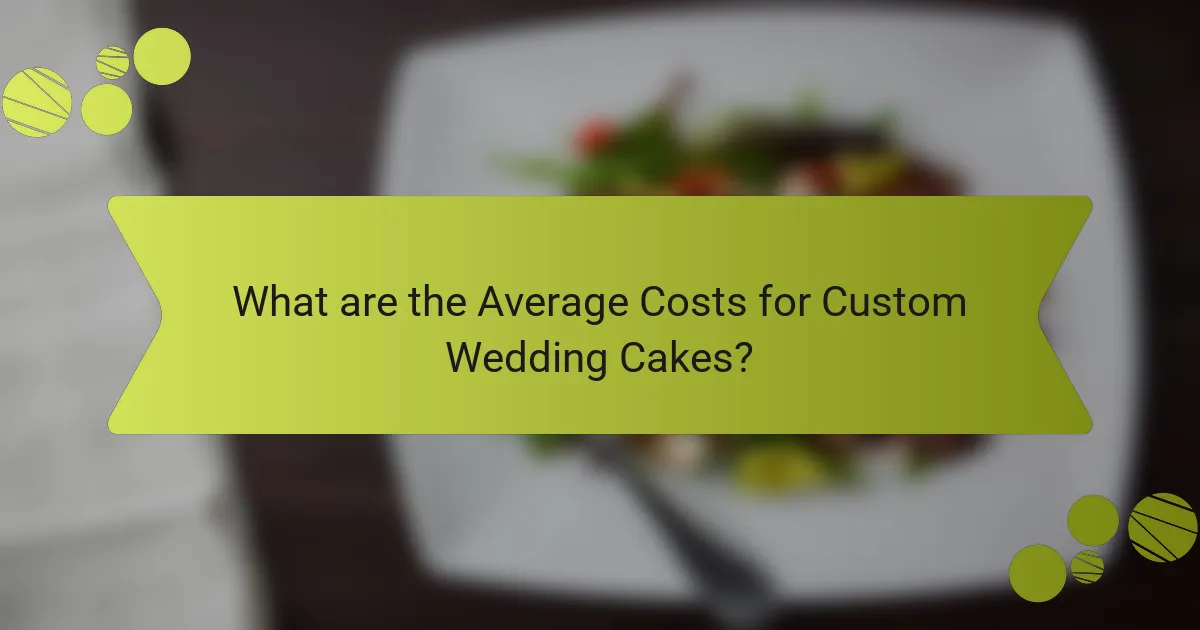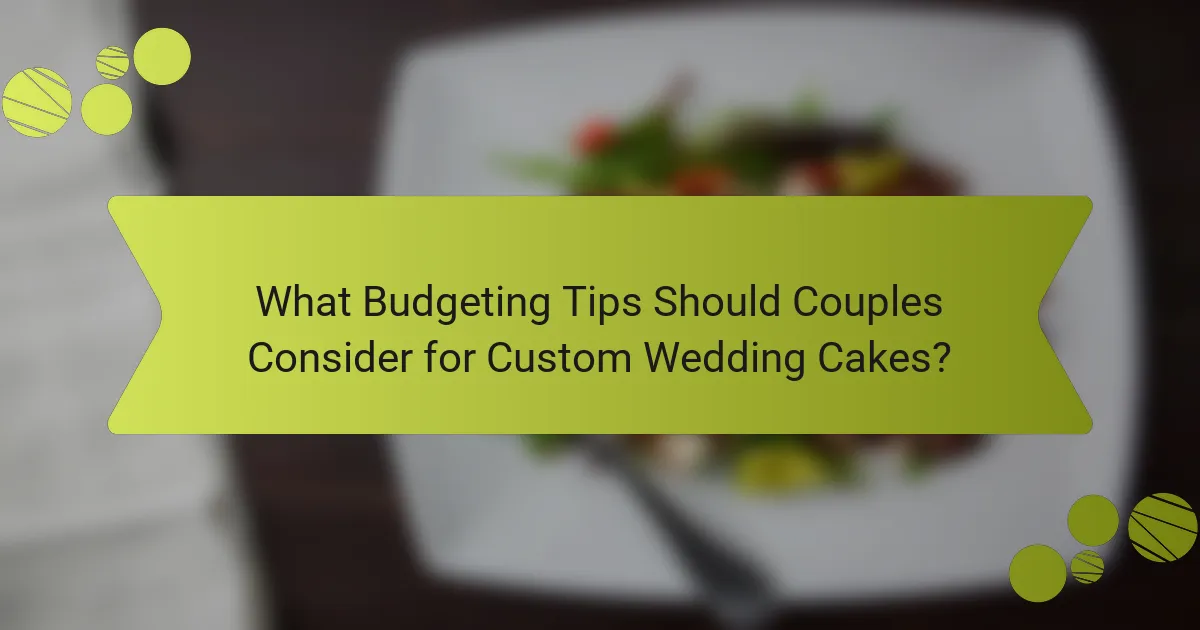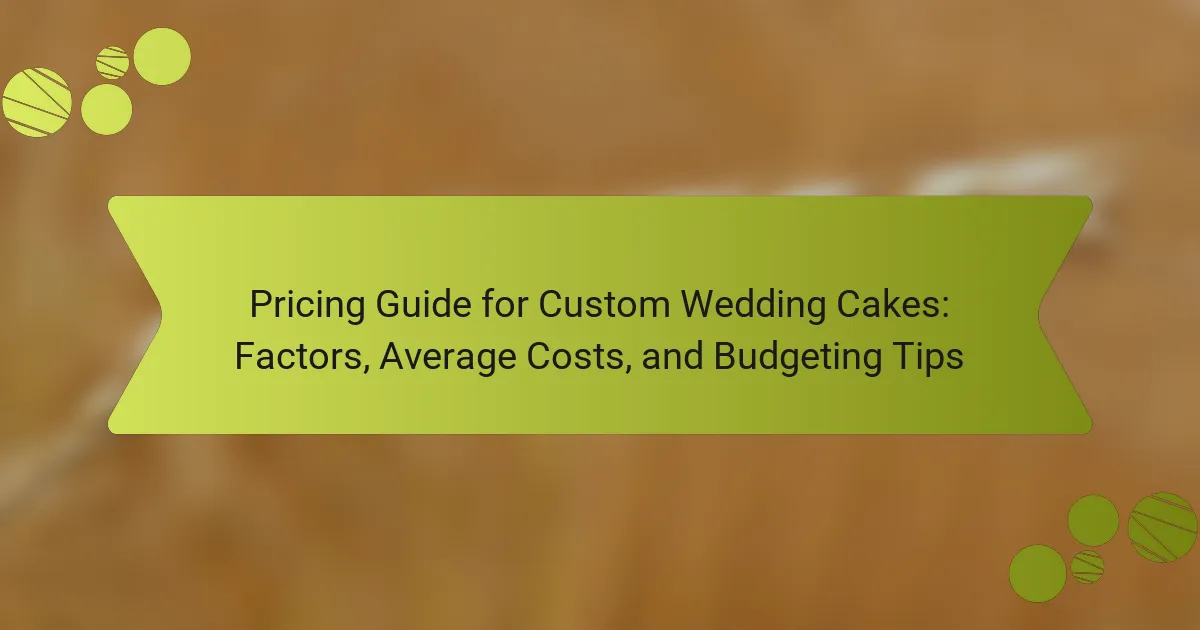Custom wedding cakes are priced based on several key factors, including size, design complexity, ingredient quality, labor costs, location, and seasonal availability of ingredients. On average, couples spend between $300 and $800, with costs typically ranging from $4 to $7 per slice. The article provides insights into how to budget effectively for a wedding cake by considering factors such as guest count, preferred designs, and potential negotiation with bakers. It also highlights regional pricing variations and emphasizes the importance of research and planning to establish realistic expectations for custom wedding cake expenses.

What Factors Influence the Pricing of Custom Wedding Cakes?
The pricing of custom wedding cakes is influenced by several key factors. These include the size of the cake, which directly affects the amount of ingredients used. The complexity of the design also plays a crucial role, as intricate decorations require more time and skill. The choice of ingredients impacts costs as well; premium ingredients raise the overall price. Labor costs are significant, reflecting the baker’s expertise and time spent on the cake. Additionally, location can affect pricing due to varying market rates in different areas. Seasonal availability of certain ingredients may also influence costs, particularly for fresh produce. Lastly, delivery and setup fees can add to the total price, especially for remote venues.
How do ingredients affect the cost of a custom wedding cake?
Ingredients significantly affect the cost of a custom wedding cake. Premium ingredients, such as organic flour, high-quality butter, and exotic flavorings, increase the price. The complexity of the ingredients also plays a role. Specialty items, like fondant or intricate decorations, add to the overall expense. Seasonal ingredients may vary in price based on availability. Custom flavors or dietary restrictions, such as gluten-free or vegan options, can further raise costs. Therefore, the choice of ingredients directly correlates to the final price of the cake.
What types of ingredients are considered premium?
Premium ingredients are high-quality components used in custom wedding cakes. These ingredients often include organic flour, high-cocoa chocolate, and pure vanilla extract. They may also feature fresh, seasonal fruits and artisanal butter. The use of premium ingredients enhances flavor and texture in the final product. Additionally, these ingredients are typically sourced from reputable suppliers or local farms. This focus on quality can significantly raise the overall cost of the cake. Premium ingredients are often chosen for their superior taste and aesthetic appeal.
How does the quality of ingredients impact flavor and design?
The quality of ingredients significantly impacts both flavor and design in custom wedding cakes. High-quality ingredients enhance flavor by providing richer and more authentic tastes. For instance, fresh fruits and premium chocolates can elevate the overall taste profile. Additionally, the texture and consistency of the cake are affected by the quality of flour and butter used.
In terms of design, superior ingredients allow for more intricate and stable decorations. Fondant made from high-quality sugar can be rolled thinner and shaped more precisely. Moreover, natural colorings from fruits or vegetables result in vibrant hues without artificial additives.
Research indicates that cakes made with fresh, local ingredients are preferred by consumers for their superior taste and aesthetic appeal. A study published in the Journal of Culinary Science & Technology highlights that ingredient quality directly correlates with customer satisfaction in baked goods.
What role does cake design complexity play in pricing?
Cake design complexity directly impacts pricing. More intricate designs require additional time and skill. This often leads to increased labor costs. Complex cakes may also need specialized materials or tools. For example, fondant decorations or detailed piping elevate expenses. According to industry standards, custom cakes can range from $2 to $10 per slice based on design complexity. A simple cake may cost around $3 per slice, while a highly detailed one can reach $8 or more. Therefore, as design complexity increases, so does the overall price.
How do intricate designs increase labor costs?
Intricate designs increase labor costs due to the additional time and skill required for their creation. These designs often involve complex patterns, detailed decorations, and precise techniques. Skilled labor is necessary to execute such designs accurately. As a result, bakers may charge higher rates for the craftsmanship involved. For example, a cake with simple decorations may take a few hours to complete. In contrast, an intricately designed cake can require several hours or even days. The increased time translates directly to higher labor costs. Additionally, specialized tools and materials may be needed to achieve the desired effect, further increasing expenses.
What are the most popular design trends and their costs?
The most popular design trends for custom wedding cakes include minimalistic designs, floral accents, and geometric patterns. Minimalistic designs typically cost between $300 to $600, depending on size and complexity. Floral accents, which can involve fresh or sugar flowers, range from $400 to $800. Geometric patterns often add a modern touch and can increase costs to around $500 to $900. Other trends like metallic finishes and textured buttercream can also be popular. Metallic finishes generally add $100 to $300 to the overall price. Textured buttercream designs can range from $350 to $700. These costs reflect the average pricing based on industry standards and regional variations.
How does the size of the cake affect its price?
The size of the cake directly affects its price. Larger cakes require more ingredients, labor, and time to create. For example, a standard wedding cake serving 50 people may cost around $300. In contrast, a cake serving 100 people could cost approximately $600. This price increase is due to the additional materials and effort needed for larger sizes. Custom designs and tiered structures also contribute to the overall cost. Therefore, cake size is a crucial factor in determining the final price.
What is the average serving size for wedding cakes?
The average serving size for wedding cakes is typically one slice per guest. A standard wedding cake slice measures about 1 inch by 2 inches. This size is designed to provide a satisfying portion without excessive waste. For example, a 6-inch cake serves approximately 12 guests, while a larger 10-inch cake can serve around 38 guests. These dimensions are commonly used in the wedding industry to ensure adequate servings for attendees.
How do tiered cakes compare in price to single-layer cakes?
Tiered cakes are generally more expensive than single-layer cakes. The cost difference is primarily due to the additional materials and labor involved in creating multiple layers. Tiered cakes require more ingredients, such as cake, filling, and frosting. They also need structural support, which adds to the expense. Moreover, the decoration of tiered cakes often involves more intricate designs and additional time for the baker. On average, tiered cakes can cost 20% to 50% more than single-layer cakes, depending on the complexity of the design.

What are the Average Costs for Custom Wedding Cakes?
The average cost for custom wedding cakes ranges from $300 to $800. Prices can vary based on factors such as design complexity, flavor choices, and cake size. On average, couples spend about $4 to $7 per slice. A cake serving 100 guests typically costs between $400 and $700. High-end custom cakes can exceed $1,000. Regional differences also influence pricing, with urban areas generally having higher costs. According to a survey by The Knot, the national average for wedding cakes is approximately $500. This data reflects current market trends and consumer spending habits.
What is the price range for custom wedding cakes?
The price range for custom wedding cakes typically varies from $300 to $1,200. Factors influencing the cost include size, design complexity, and ingredients. Basic cakes start around $300 for simple designs. More elaborate cakes can exceed $1,000. On average, couples spend about $500 to $800 for a mid-range cake. Customization options, such as fondant or intricate decorations, can increase the price. Local market rates also affect pricing, with urban areas often charging more.
How do regional differences affect wedding cake pricing?
Regional differences significantly affect wedding cake pricing due to variations in ingredient costs, labor rates, and market demand. In urban areas, higher living costs often lead to increased prices for cakes. Conversely, rural regions may have lower pricing due to reduced overhead costs.
Additionally, regional preferences for cake styles and flavors can influence pricing. For example, elaborate designs may be more common in certain areas, driving up costs. Local competition also plays a role; areas with many bakeries may see lower prices due to market saturation.
According to a study by The Knot in 2022, average wedding cake costs ranged from $300 in some regions to over $1,000 in metropolitan areas. This data highlights the significant impact of location on pricing.
What are typical costs for different cake sizes?
Typical costs for different cake sizes vary significantly. A small cake, serving 10-15 people, typically costs between $30 and $50. A medium cake, serving 20-30 people, generally ranges from $60 to $100. A large cake, serving 40-60 people, can cost between $150 and $300. Extra-large cakes, serving 80 or more, often start at $300 and can exceed $500. These prices depend on factors like ingredients, design complexity, and regional market rates. Customization and additional decorations can further increase costs.
How can additional features impact the overall cost?
Additional features can significantly increase the overall cost of custom wedding cakes. Each added feature, such as intricate designs or specialized flavors, requires more time and resources. For instance, custom fondant work can add $2 to $5 per serving. Similarly, unique flavor combinations may incur additional ingredient costs. The complexity of the cake’s structure also plays a role; multi-tiered cakes typically cost more due to the increased labor and materials. According to industry standards, a basic cake may start at $3 per serving, while cakes with numerous additional features can rise to $10 or more per serving. Therefore, the overall cost is directly influenced by the number and type of additional features chosen.
What are common add-ons that increase cake prices?
Common add-ons that increase cake prices include custom flavors, intricate designs, and premium ingredients. Custom flavors, such as exotic fruit or specialty chocolate, often require additional costs. Intricate designs, including fondant work or detailed decorations, also contribute to higher prices. Premium ingredients, like organic or gluten-free options, can further raise costs. Additional tiers or larger sizes increase the overall cake price significantly. Delivery fees for elaborate setups can also add to the final cost. Finally, personalized cake toppers or special packaging may incur extra charges.
How do delivery and setup fees factor into the total cost?
Delivery and setup fees are additional costs that contribute to the total price of custom wedding cakes. These fees typically cover transportation of the cake to the venue and the assembly of the cake on-site. Delivery fees can vary based on distance from the bakery to the venue. For example, a local delivery may cost less than a long-distance delivery. Setup fees may also be charged if the cake requires special arrangements or intricate assembly. Together, these fees can significantly increase the overall expenditure. For instance, delivery fees may range from $50 to $200, while setup fees can add another $25 to $100. Therefore, it is essential to include these costs when budgeting for a custom wedding cake.
What are some examples of budget-friendly wedding cake options?
Some examples of budget-friendly wedding cake options include simple buttercream cakes, sheet cakes, and cupcakes. Buttercream cakes are often less expensive than fondant-covered cakes. Sheet cakes can serve a large number of guests at a lower cost. Cupcakes offer a fun and trendy alternative, allowing for variety without the expense of a tiered cake. Additionally, using seasonal fruits as decorations can reduce costs. These options can help couples stay within their budget while still providing a delicious cake for their special day.
How can couples save money without sacrificing quality?
Couples can save money on custom wedding cakes without sacrificing quality by opting for simpler designs. Simple designs typically require less labor and fewer materials, which reduces costs. Choosing a smaller cake that serves fewer guests can also lower expenses while maintaining quality. Selecting a less expensive flavor or filling can further help manage the budget. Couples can also consider ordering their cake during off-peak seasons or days to take advantage of lower prices. Research indicates that cakes ordered during non-peak times can be up to 20% cheaper. Additionally, couples can ask for a smaller display cake with a larger sheet cake for serving, which can significantly cut costs without compromising the overall presentation.
What are the pros and cons of DIY wedding cakes?
DIY wedding cakes have several pros and cons.
Pros include cost savings. Making a cake at home can be significantly cheaper than purchasing one. DIY cakes allow for personalization. Couples can choose flavors, designs, and decorations that reflect their style. Another advantage is the opportunity for creativity. Couples can experiment with unique recipes and designs. Additionally, DIY cakes can enhance the wedding experience. Baking together can be a fun activity for couples and families.
Cons include time constraints. Baking a wedding cake can be time-consuming and stressful. There is also the risk of inexperience. Lack of baking skills may result in a less-than-perfect cake. Another downside is the potential for unforeseen issues. Cakes may not turn out as planned, leading to disappointment. Lastly, there are storage and transport considerations. A homemade cake may require special handling to prevent damage before the event.

What Budgeting Tips Should Couples Consider for Custom Wedding Cakes?
Couples should consider setting a clear budget for custom wedding cakes. Determine a maximum amount to spend before consulting bakers. Research average costs in your area to establish realistic expectations. Prioritize cake design elements that are most important to you. Consider the number of guests to avoid overspending on size. Opt for seasonal flavors or simpler designs to reduce costs. Schedule tastings with multiple bakers to compare prices and quality. Be open to negotiation on pricing and ask about package deals.
How can couples effectively budget for their wedding cake?
Couples can effectively budget for their wedding cake by determining their total cake budget early in the planning process. They should research average cake prices in their area, which typically range from $3 to $10 per slice. Couples must decide on their guest list size to estimate the number of slices needed. They can also choose simpler designs to reduce costs, as intricate decorations can increase the price significantly. Additionally, couples should consider seasonal ingredients, which can lower costs. Comparing quotes from multiple bakers helps ensure they find the best value. Setting aside a portion of the overall wedding budget specifically for the cake can aid in managing expenses. Finally, couples should communicate their budget clearly with their chosen baker to avoid unexpected costs.
What percentage of the overall wedding budget should be allocated to the cake?
Typically, 5-10% of the overall wedding budget should be allocated to the cake. This percentage can vary based on the overall budget and cake complexity. For example, if the total budget is $30,000, allocating $1,500 to $3,000 for the cake aligns with common budgeting practices. This range allows for a quality cake that meets aesthetic and taste expectations. According to wedding industry surveys, couples often find this allocation reasonable for a memorable wedding cake experience.
How can couples prioritize their cake budget based on guest count?
Couples can prioritize their cake budget based on guest count by calculating the cost per slice. Custom wedding cakes typically range from $3 to $10 per slice, depending on design and ingredients. Multiply the cost per slice by the total guest count to determine the overall cake budget. For example, a cake for 100 guests at $5 per slice would cost $500. Couples should also consider the cake’s size and design complexity, as these factors can affect pricing. Simplifying the design or opting for a smaller cake can help manage costs. Additionally, couples can choose to serve a smaller, decorative cake for display and provide sheet cakes for serving. This approach can reduce expenses while still offering a beautiful centerpiece.
What questions should couples ask their baker during consultations?
Couples should ask their baker about flavors, designs, and pricing. They should inquire about available cake flavors and fillings. Couples should also discuss design options and customization possibilities. It’s important to ask about the baker’s experience with wedding cakes. Couples should confirm the delivery and setup process. They should also inquire about tasting sessions and if there are any additional fees. Understanding the timeline for ordering and finalizing details is crucial. Lastly, couples should ask about cancellation and refund policies.
How can understanding pricing structures help in negotiations?
Understanding pricing structures aids in negotiations by providing clarity on cost components. Clear knowledge of ingredients, labor, and overhead helps in assessing the fairness of prices. It allows negotiators to identify areas where costs can be adjusted. For example, knowing the average cost of cake ingredients can help in determining a reasonable markup. This understanding can lead to more effective discussions about discounts or value-added services. Additionally, it empowers negotiators to challenge inflated prices with factual data. Overall, a solid grasp of pricing structures fosters transparency and trust in negotiations.
What are the key details to clarify in a contract?
Key details to clarify in a contract include pricing, delivery dates, and payment terms. Pricing should specify total costs and any additional fees. Delivery dates must outline when the cake will be delivered. Payment terms should detail deposit amounts and final payment deadlines. Cancellation policies should also be included to protect both parties. Additionally, the contract should cover any specific customization requests. It is essential to clarify liability for damages during transport. Lastly, ensure that both parties’ contact information is accurate for effective communication.
What are some common pitfalls to avoid when budgeting for wedding cakes?
Common pitfalls to avoid when budgeting for wedding cakes include underestimating costs, neglecting to account for design complexity, and failing to compare multiple bakeries. Many couples overlook additional expenses like delivery fees and taxes. Ignoring the importance of guest count can lead to insufficient cake size. Some couples may also forget to factor in tasting sessions, which can incur costs. Lastly, waiting too long to book a cake can limit options and increase prices. These factors can significantly impact the overall budget.
How can couples ensure they don’t overspend on their cake?
Couples can ensure they don’t overspend on their cake by setting a clear budget before shopping. Establish a specific price range for the cake. Research average cake prices in the area to gauge reasonable costs. Compare quotes from multiple bakers to find competitive pricing. Choose a simpler design to reduce costs, as intricate details can increase the price. Limit the cake size to the number of guests, avoiding excess that won’t be consumed. Consider alternative cake options, such as smaller cakes or sheet cakes, which can be more cost-effective. By following these steps, couples can manage their cake expenses effectively.
What mistakes should be avoided when choosing a cake design?
Avoiding mistakes when choosing a cake design is crucial for a successful event. One common mistake is not considering the theme of the wedding. The cake design should complement the overall aesthetic. Another mistake is overlooking the size of the cake. A cake that is too small may not serve all guests. Additionally, failing to communicate dietary restrictions can lead to issues. Not discussing budget constraints upfront can also cause problems later. Lastly, neglecting to review the cake designer’s portfolio may result in unmet expectations. Each of these mistakes can significantly impact the satisfaction with the final cake.
The main entity of this article is custom wedding cakes, focusing on their pricing. Key factors influencing the cost include cake size, design complexity, ingredient quality, and labor expenses. The article provides an overview of average costs, ranging from $300 to $1,200, and offers budgeting tips for couples to manage their expenses effectively. Additionally, it discusses the impact of regional differences, seasonal ingredients, and common add-ons on pricing, ensuring couples are well-informed when planning their wedding cake budget.
